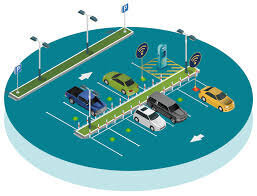Smart Parking Solutions leverage advanced technologies such as artificial intelligence (AI) and real-time data to enhance the efficiency of parking management. These systems utilize smart parking sensors, parking apps, and video analytics to help users find and manage parking spaces seamlessly.
AI and Real-Time Data
AI plays a crucial role in smart parking solutions by analyzing data from various sources to determine the availability of parking spaces. Systems like AI-PARKING utilize deep neural networks to monitor parking spots, identifying whether they are free or occupied. This technology can be deployed on multiple hardware platforms, including edge devices and servers, providing flexibility in implementation[1][2].
Real-time data collection is essential for effective parking management. For instance, smart parking apps can inform users about available spaces, reducing the time spent searching for parking. This not only enhances user experience but also decreases traffic congestion caused by drivers circling around to find spots[2][4].
Smart Parking Sensors and Video Analytics
Smart parking sensors are integral to these systems, providing accurate occupancy data. These sensors can be installed in parking lots or on-street parking spaces, allowing for comprehensive monitoring. Companies like Parquery employ cameras and AI algorithms to detect vehicle presence under various conditions, ensuring high accuracy even in challenging environments such as low light or inclement weather[3][4].
Video analytics further enhance the capabilities of smart parking systems. By using image processing techniques, these systems can recognize license plates and monitor parking duration, enabling features like automated billing and reservation systems. This technology not only streamlines the parking process but also provides valuable insights into parking patterns and usage statistics[1][2].
Reservation Systems and User Convenience
Smart parking solutions often include mobile applications that allow users to reserve parking spaces in advance. This feature is particularly beneficial in urban areas where parking demand exceeds supply. Users can book a spot before arriving, ensuring they have a place to park and reducing the likelihood of frustration associated with finding a space[2][4].
Moreover, these applications can integrate with other smart city initiatives, providing a holistic approach to urban mobility. For example, in cities like San Francisco, smart parking apps have been implemented to offer real-time updates on available spaces, contributing to improved traffic flow and reduced emissions from vehicles searching for parking[4].
Conclusion
The integration of AI and real-time data in smart parking solutions represents a significant advancement in urban mobility management. By utilizing smart parking sensors, video analytics, and user-friendly applications, these systems not only enhance the parking experience but also contribute to more efficient use of urban space. As cities continue to grow, the adoption of such technologies will be crucial in addressing the challenges of parking and traffic congestion.
Further Reading
1. AI Smart Parking | A.I. Tech srl
2. How AI based Smart Parking System can solve parking problems?
3. Parquery’s Smart Parking solution behind the scenes
4. How AI enables modern parking solutions for smart cities – Tomorrow.City – The biggest platform about urban innovation
5. AMD to Power AI-Based Smart Parking Solution for Sun Singapore, the Country’s Largest Provider of Smart Parking Services :: Advanced Micro Devices, In…


